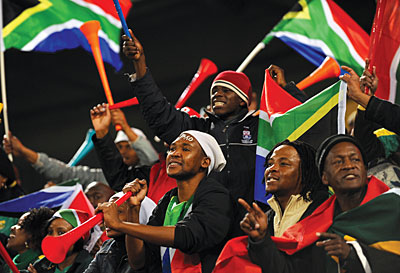 |
Starting today, more than a billion people around the world will hear the sound of the vuvuzela, the South African plastic horn, as the World Cup hogs the fibre optic networks like nothing has done before. For the first time in history, coverage of this worldwide event will be delivered through live 3D, HD television, online streaming and mobile technologies, surpassing traditional media outlets like television, radio and newspapers.
A lot can change in four years. And events like these become not just an excuse for wearing bright nylon jerseys and drinking, but also milestones for measuring technological, political and social progress.
The biggest story this year, unless the United States wins the cup, will be about the host. Until 1994, the World Cup hadn't even been televised in South Africa. This year, it has spent billions of dollars building world class stadiums for the multi-national event that Archbishop Desmond Tutu described being as "important as Obama getting into the White House." As the country's former President Thabo Mbeki has said, South Africa hopes the tournament will be another Mandela moment,�"when Africa stood tall and resolutely turned the tide of centuries of poverty and conflict."
More than 300,000 football fans from around the world will arrive in South Africa this week. Thirty-two teams and 736 players will play in 10 venues across the country. Did anyone living under apartheid, when 90 per cent of the population had no voice or voting rights, think this was possible? Did Nelson Mandela envision this day when he walked out of Robben Island prison in 1990? Today, South Africa carries the mantle of pride for the entire continent, as it welcomes the world to Africa.
Here in Nepal, the World Cup fanfare will be centred on urban areas, as when my father bought his first television for the World Cup in 1994, the same year South Africa held its first democratic and multi-racial elections. Most Nepalis will hear of the tournament through special advertising campaigns by noodle companies, even if they are delivered to their villages by mules.
For those of us who like indulge in self-reflection, South Africa's experience is not about when Nepal, or South Asia for that matter, will host the games. Nor is it about when our team will make it to the games, although just imagine how wonderful that will be if supporting proxies can be so much fun (Go England!). We got a peace agreement soon after Fabio Cannavaro kissed the World Cup trophy in 2006, and abolished the monarchy subsequently. But do we have anything to show for the years since, beside the utter political disarray and the proliferation of MSG-laden ramen brands? Perhaps the South Africans can lend us their vuvuzelas to wake us up from this slumber.
READ ALSO:
GOOOOAAAAL?
Life support, Publisher's note
The intellectual dilemma, Mohan Bikram Singh
Losing ground, Prashant Jha
The partisan press, CK Lal
Making work work, Ashutosh Tiwari
350 days for new constitution, Ass



